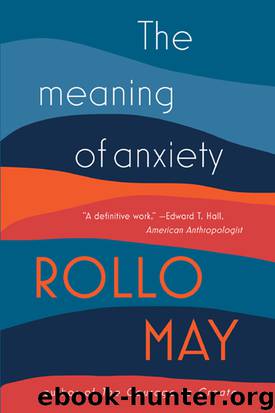The Meaning of Anxiety by Rollo May

Author:Rollo May
Language: eng
Format: epub
Publisher: W. W. Norton & Company
CULTURE AND COMMUNITY
I have discussed in the last chapter the genetic background of a pattern which is the occasion for much anxiety in contemporaneous culture—namely, individual competitive ambition. It remains to summarize the status of the personality in our society with respect to this pattern and then to consider particularly the quantity of contemporaneous anxiety in relation to the historical stage of development of modern culture.
To recapitulate briefly, social prestige goals are dominant in our culture, social prestige being defined as success, this success in turn being defined chiefly in economic terms. The acquisition of wealth is accepted as proof and symbol of individual power. Since success is measured against the status of others, the striving for success is essentially competitive: one is successful if one excels and triumphs over others. The goal of competitive success not only arose by virtue of an emphasis on individual power set over against the community in the Renaissance, but as this goal persists it tends always to increase the juxtaposition of the individual and the community. Being the dominant cultural value, competitive success is likewise the dominant criterion of self-valuation; it is accepted as the means of validating the self in one’s own eyes as well as in the eyes of others. Whatever threatens this goal is, therefore, the occasion for profound anxiety for the individual in our culture because the threat is to values held essential to one’s existence as a personality—i.e., essential to one’s worth and prestige as a personality.
The dominant goal of competitive success, though defined chiefly in economic terms, carries over to become the individual’s goal in his personal relationships as well. Horney has excellently described this phenomenon in our culture:
It must be emphasized that competitiveness, and the potential hostility that accompanies it, pervades all human relationships. Competitiveness is one of the predominant factors in social relationships. It pervades the relationships between men and men, between women and women, and whether the point of competition be popularity, competence, attractiveness, or any other social value, it greatly impairs the possibilities of reliable friendship. It also as already indicated disturbs the relations between men and women, not only in the choice of the partner but in the entire struggle with him for superiority. It pervades school life. And perhaps most important of all, it pervades the family situation, so that as a rule the child is inoculated with this germ from the very beginning.14
Thus love, for example, instead of being a constructive means of overcoming individual isolation, is often a means of self- aggrandizement. One uses love for competitive purposes in the rivalry over winning a socially desirable and enviable mate; it is a proof of one’s social competence; the mate is viewed as an acquisition in much the same way as one would view winning profits on the stock market. Another common example is valuing one’s children because they win prizes in college or in other ways add to the competitive status of the family name. In our culture love
Download
This site does not store any files on its server. We only index and link to content provided by other sites. Please contact the content providers to delete copyright contents if any and email us, we'll remove relevant links or contents immediately.
| Behaviorism | Cognitive Behavioral Therapy |
| Existential | Gestalt |
| Humanistic | Jungian |
| Psychoanalysis | Transpersonal |
The Art of Thinking Clearly by Rolf Dobelli(10417)
The 5 Love Languages: The Secret to Love That Lasts by Gary Chapman(9782)
Mindhunter: Inside the FBI's Elite Serial Crime Unit by John E. Douglas & Mark Olshaker(9313)
Becoming Supernatural by Dr. Joe Dispenza(8196)
Nudge - Improving Decisions about Health, Wealth, and Happiness by Thaler Sunstein(7689)
The Road Less Traveled by M. Scott Peck(7591)
Mastermind: How to Think Like Sherlock Holmes by Maria Konnikova(7313)
Enlightenment Now: The Case for Reason, Science, Humanism, and Progress by Steven Pinker(7305)
Win Bigly by Scott Adams(7183)
The Way of Zen by Alan W. Watts(6594)
Factfulness: Ten Reasons We're Wrong About the World – and Why Things Are Better Than You Think by Hans Rosling(4729)
The State of Affairs by Esther Perel(4710)
Gerald's Game by Stephen King(4639)
Man's Search for Meaning by Viktor Frankl(4573)
The Confidence Code by Katty Kay(4248)
Thinking in Bets by Annie Duke(4216)
The Healing Self by Deepak Chopra(3568)
Hidden Persuasion: 33 psychological influence techniques in advertising by Marc Andrews & Matthijs van Leeuwen & Rick van Baaren(3549)
The Worm at the Core by Sheldon Solomon(3483)
